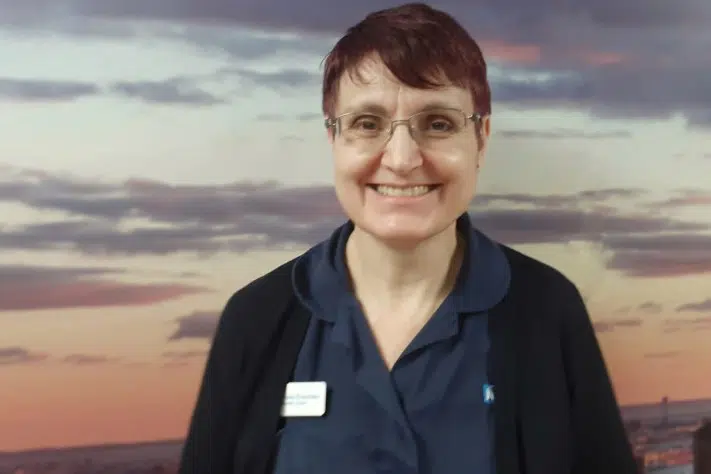22nd February 2022
Ruth Haas Eckersley, Specialist Community Health Practitioner (Health Visitor) at Rochdale East Health Visiting Service, shares her thoughts on becoming a health visiting researcher.

Ruth Haas Eckersley,
Specialist Community Health Practitioner (Health Visitor), Rochdale East Health Visiting Service
To be asked to write a blog about my journey and achievements made me feel a bit like an imposter as I have not yet published any research nor been a principal investigator in a study; I am only just dipping my toes in, but then, at which point do you actually become a researcher?
How it started
Although I was always interested in research, especially since completing my Master’s dissertation as a top up, the path in the last year was not exactly planned; it was more of a leap of faith with one opportunity leading to another. When the advert for the innovative 9-month National Institute of Health Research (NIHR) Early Career Researcher Development Pathway Programme arrived in my inbox, I knew I wanted to apply and was lucky to be successful. And what an opportunity it has been so far! I loved being part of an inspiring like-minded group of 30 Allied Health Professionals (AHPs) and nurses, enjoyed working with leadership coaches and a range of visiting speakers from academic and clinical backgrounds. I observed research activity and have had fantastic support from a personal mentor. What an excellent first step to develop into a researcher! It opened my mind to opportunities I never thought of. So, when the Health Education England (HEE)/NIHR Integrated Clinical Academic Internship was advertised, I felt inspired and confident to apply, and again, was extremely lucky to be chosen. The remit of the internship offers me the environment and support with protected time (one day a week) to progress my research leadership journey, whilst simultaneously benefitting my team and service. It is the first step for me in accessing a clinical academic career and will hopefully shine a light on the ‘art of the possible’ for my colleagues.
Timing
The timing for me could not have been better; there are currently several drivers in nursing that support engagement in nursing research on all levels including the especially relevant draft SCPHN standard: with research listed as core standard[1], the inclusion in the CQC inspection framework[2] and, most recently in November 2021, the Chief Nursing Officer (CNO) for England’s first ever strategic plan for research[3]. Additionally, Nursing, Midwifery and Allied Health Professionals’ (NMAHP) research strategies are currently being developed widely in trusts and Clinical Research Networks (CRNs), and the national AHP Strategy was launched last month[4]. Referring to these drivers was helpful for me to start a discussion about the importance of research with service leads and managers, who ultimately hold the key to supporting research developments within trusts.
Good practice
I have been fortunate to work with Louise Wolstenholme, Sheffield, as my mentor – who for me is one of the few health visitors in the North who pioneered a leadership role for research. She is an iHV Research Champion and NIHR 70@70 Senior Nurse Research Leader. She co-facilitates the 0-19 Research Network CRN Yorkshire and Humber which has been successful in increasing the research capacity in the area. I was impressed by the broad enthusiasm to embed research in practice evident in the forum; something I have yet to see in my area.
Challenges
Throughout our training we recognised the benefits of research and evidence-based practice for patient care, but this is rarely translated into individual practice and often gets lost in the busy day-to-day work. Making a difference for a specific family makes us feel good. Yet, if we want to improve health on a bigger scale, on population level, and improve the lives of children and their families particularly from underserved groups, then research and evidence-based practice is key and not optional; even more so in times of reduced funding, reduced service capacity and in view of increasing poverty and deprivation levels. Services are stretched everywhere, and it is difficult to keep the momentum for anything outside the normal service requirements. But making a case for health visiting and its wider impact can help us focus and embed research in practice.
Next steps
Pathways for research leadership careers and roles require strengthening within the health visiting profession. Strengthening these pathways is needed to enable health visiting research contribution to be taken seriously, alongside increasing the research capacity within teams and services. In my opinion, the iHV is best placed to support these development opportunities and career pathways and set out how public health practitioners can be research active within their roles. I’d love to see the iHV Research Champions more visible in their relative CRN regions to normalise research involvement for practitioners and inspire others.
Ruth Haas Eckersley, Specialist Community Health Practitioner (Health Visitor), Rochdale East Health Visiting Service
References
[1] NMC, ‘Standards of proficiency for specialist community public health nursing- draft’, January 2021
[2] CQC ‘Inspection framework: NHS trusts and foundation trusts’, 2020
[3] NHS England and NHS Improvement ‘Chief Nursing Officer for England’s strategic plan for research’, 2021
[4] HEE ‘ Allied Health Professions Research and Innovation Strategy, 2022
Find out about the ‘Early Career Researcher Development Pathway Programme’
Find out about ‘HEE/NIHR Integrated Clinical Academic Programme’

